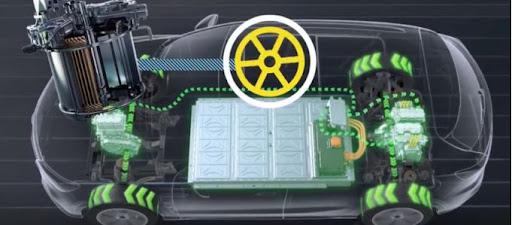The rapid development of the electric vehicle (EV) industry has made the on-board inverter, aas the core component of converting direct current (DC) to alternating current (AC), plays a crucial role in improving the performance and driving experience of electric vehicles. This article delves into the growth trends of the EV inverter market, SiC technology, and future directions.
Inverters: the heart of electric vehicles
Inverters are indispensable in modern EVs, where they convert the DC from the vehicle's high-voltage battery into AC to power the main motor. This conversion directly impacts the EV's range, performance, and driving experience. As EVs demand higher range and performance, inverter design is evolving towards higher efficiency.
Rise of silicon carbide (SiC)
To achieve higher performance, the transition from silicon-based Insulated Gate Bipolar Transistors (IGBTs) to SiC in high-voltage power switches is crucial. SiC MOSFETs offer higher voltage endurance, faster switching speeds, and operate at lower temperatures, reducing the weight of the power drive system and energy loss. TrendForce reports that in Q4 of 2023, inverters equipped with SiC power chips constituted 15% of the total inverter installation volume.

SiC development and supply chain cooperation
Several companies are actively promoting the development of SiC technology. In addition to international players like ST and Infineon, domestic SiC has made significant progress, with companies like Fei Semiconductor and Xintar introducing automotive-grade SiC MOSFET products. To ensure a stable supply of SiC chips, collaborations between automotive manufacturers and upstream semiconductor companies are becoming more common, such as the strategic partnership between Li Auto and Xilian Integration.
Future of Integrated Drive Systems
Integrated drive systems, with inverters and motors at their core, represent another significant direction in the development of EV powertrain systems. These systems integrate power control components such as On-Board Chargers (OBCs), DC/DC converters, and Battery Management Systems (BMS) into a single system to reduce vehicle weight and enhance overall range. Many automotive manufacturers and Tier 1 suppliers are now introducing integrated drive systems centered around inverters.
Conclusion
The technological progress of vehicle inverters plays a key role in enhancing the performance of EVs. With the widespread application of SiC technology and the continuous optimization of integrated drive systems, the power, range, and safety of EVs are set to improve significantly. The convergence and development of these technologies herald a bright future for the EV industry and present substantial market opportunities for inverter manufacturers and related supply chain enterprises. As the technology matures and costs decrease, it is anticipated that SiC inverters and integrated drive systems will become standard in future EVs, propelling the industry towards higher efficiency and environmental sustainability.
Website: www.conevoelec.com
Email: info@conevoelec.com








